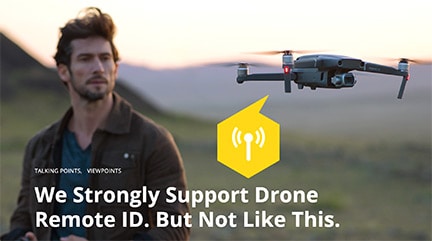More on drone remote ID; can Evo 2 really deliver those specs?

by Peter Weinberger | pweinberger@claremont-courier.com
Once the drone community was able to digest the 180 pages of detail for new proposed FAA Remote ID laws, it became clear there was huge concern of the negative impact on the drone industry. Since the December 2019 announcement for feedback, the concerns focus on how these complex laws make it too difficult to fly a drone in the US.
It’s not like Remote ID for drones doesn’t have support. There are many within the industry who agree that giving drones a digital license plate is needed for a variety of reasons. Cars and planes have license plates, why not drones? But when the FAA literally wants to track drones in the air, the pilots on the ground, through an expensive third party service using personal cell phone signals, is simply Big Brother FAA style. And that’s just the beginning.
One example is the drone leader DJI, who has supported Remote ID in the past, strongly rejected the FAA version because of huge pilot expenses and implementation issues. On the DJI website is an editorial with the headline, “We strongly support drone Remote ID. But not like this.”
They stated “DJI wants governments to require Remote ID for drones, but the FAA has proposed a complex, expensive, and intrusive system that would make it harder to use drones in America, and that jeopardizes the success of the Remote ID initiative. Instead, we support a simpler, easier, and free version of Remote ID that doesn’t need a cellular connection or a service subscription.”
All this is bad news because the large majority of drone operators want to work with the FAA. But by adding regulation after regulation, requirement after requirement, makes one wonder how concerned they are about the people actually piloting these drones.
And it doesn’t stop there, as many others are raising privacy and operator safety concerns—all flight data, including the pilot’s ground location, would be broadcast using personal cellphones while in the air. As someone who has been jumped by angry people while flying safely and legally, I don’t like the idea of being tracked.
Needless the say, more will be revealed. We can only hope the FAA will seriously consider the feedback they are receiving. It’s getting to a point where launching a drone in the US will need a rulebook, lawyer and big bank account, just to make sure you don’t break any laws.
Autel Evo 2 specs rev up the industry
There was huge excitement when in late December Autel announced the Evo 2 drone with incredible specs. They even attended CES last minute and had prototypes ready for people to try out. Autel’s announcement also had a big impact on DJI, who at the time thought they we ahead in the drone market. Now we have real competition!
But as quickly as they announced the new drone, came a letter from Autel announcing a delay in production until March 2020. Since that time almost two months ago, there hasn’t been a peep other than an update on pricing. Only a few companies are even offering to take deposits so far. DJI has already pushed the production of the Mavic 3 back, given these latest developments.
Can Autel still deliver? Drone manufactures are known to exaggerate claims, especially in areas like connectivity and range. Currently, no drone even comes close to DJI in range, and some who tested the Evo 2 doubted the drone could fly near the stated 9 km range. One reviewer mentioned they had signal issues after just 1000 feet, and they were not in a congested location.
Drone range is a huge issue for operators, because although you would never fly that far away, it helps connectivity in congested areas. I believe DJI with the OcuSync transmission system, is the only drone manufacturer to deliver on range promises. So it’s important to take a wait and see attitude.
So when will Autel actually start delivering the Evo 2? As of February 26, 2020, the only sounds I hear are crickets.










0 Comments